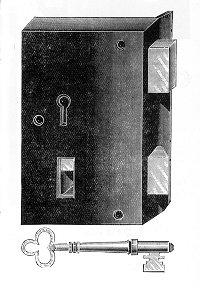
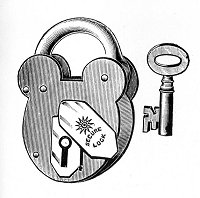
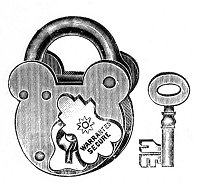
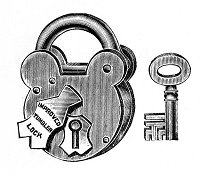
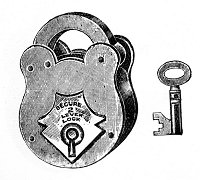
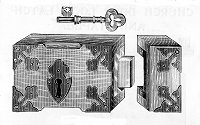
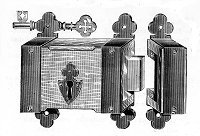
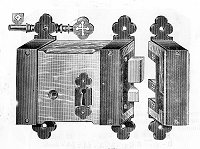
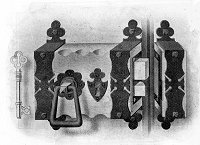
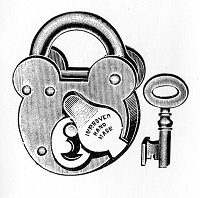
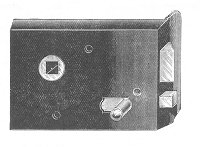
|
The later Tildesley takes us forward in time. He comments
that "originally locks were made by small master men in tiny shops at
the rear of their own homes. No machinery was used and as late as 1856
we are told that even large manufacturers such as Messrs. Chubb of
Wolverhampton made their locks entirely by hand". But machinery was
creeping in. In 1796 "Isaac Mason of Bilston came to reside in
Willenhall and bought new methods of pressing out lock parts which he
had recently perfected. The operation was carried out on a fly-press and
meant the saving of much labour and time". Then in 1812 John Grimley
moved from Birmingham to Willenhall and started to make keys using a
drop forge. Nevertheless, Tildesley says it was not until the first half
of the 20th
century that machinery was extensively used – which, he points out, meant
that "the emphasis has passed from the locksmith to the toolmaker, for
with the perfectly designed and accurately made tools the final
operation of assembly has been so simplified that, in most cases, it can
be done by semi-skilled labour". He says that "one of the earliest firms
to use machinery was John Harper and Company of Albion Works who, in
1856, installed a Nasmith steam hammer for forging purposes".
We get another picture of the industry in the later
nineteenth century from the history of two productive co-operatives.
These were associations of individual workers who came together to form
a co-operative in accordance with the principles of co-operation that
had lead to the creation of so many retail co-operative shops. These
productive co-operatives do not seem to have been long lived or very
successfully, except where they sold their production to co-operative
retailers. But there were two such co-ops in the Wolverhampton lock
industry, details of which are given in Ned Williams’ The Co-op In
Birmingham and the Black Country (Uralia Press, 1993, at p.118).
In September 1877 the Co-operative News gave an account of
"The Wolverhampton and Breedwood Industrial and Provident Plate Lock
Manufacturing Society". It is interesting to note that lock making was
still sufficiently divided for the makers of plate locks ("of iron, with
mighty keys and intricate wards, burglar proof and admirable for barn
doors") to form their own co-operative; and that Brewood was still
sufficiently involved in the lock making industry to be included.
Ned Williams thinks that this Society may have come into
existence in 1864, possibly as a result of a strike in the local plate
lock industry. He also records that they were fortunate to find a
benefactor who provided the first premises. Indeed, judging by the
histories of other such co-operatives support from the more moneyed
classes was not that uncommon. But the Co-operative News took a more
confrontational approach in its account:
"[S]even plate lock makers, holding between them just
£13 in money, formed a society and began business on their own account.
"The first result that followed was the combination of
the Wolverhampton firms in that line against them. The idea of fair play
and "live and let live" is not strong in the English manufacturer, and
for many months a bitter commercial quarrel raged between these workmen
and their late employers…. On one side a number of wealthy firms, on the
other a feeble little society of locksmiths, a handful of men, striving
to make the labour of their hands more fruitful. For many weeks the
society sold its goods at a loss, till at last the quality of the locks
became known, more of their fellows joined, and the ruinous competition
came to an end. The little shop on Stafford Street has now grown to
three, the little company of seven has increased to seventy five, the
society’s sales now reach £300 a week, while the capital has grown from
£13 to £16,000."
Despite all this the Society seems to have been wound up
on 11th
August 1879. "A letter published in The Times explained that a lack of
orders and an excess of unsold stock caused its demise. The iron trades
went into a great depression at about that time, and therefore the
co-operative’s demise has to be seen in that context." It might also be
the case that, although individuals continued working on their own well
into the next century, the co-op’s position was not helped by the
increasing influence on the industry of highly capitalised mass
producers. A second attempt at co-operation, The Wolverhampton General
Locksmiths’ Co-operative Society, started in 1890, was reported in 1892
as making locks for the General Post Office, but had faded from the
scene by 1895.
It was a natural result of the coming of machinery that
larger firms, mostly registered limited liability companies, with access
to the necessary capital, entered the industry, which they came to
dominate, largely, though not exclusively, until the middle of the 20th
century, excluding the individual or family locksmith.
It seems a natural extension of lock making and bolt
making, to go on to make general hardware. That is what some
companies did. But some companies moved the other way,
starting as producers of general ironware and then adding locks and
bolts to their range.
At some point the lock making industry added safe making
to its repertoire with, it seems, some existing companies simply moving
into the trade and others being set up for the express and more or less
exclusive purpose. It is interesting to note that the safe making
industry entered into the export trade, despite the difficulties which
the weight of their products must have caused.
Once you are into making locks and safes, it is natural to
diversify into other security devices and systems and some bigger
companies started on such things as strong rooms, safe deposit systems
and the like. Thus in the Wolverhampton Official Year Book for 1953
Chubbs are described as: "Bankers’ engineers, manufacturers of bankers’
anti-blowpipe safes and doors, strong rooms and linings, burglar and
fire-resisting safes and strong room doors, steel grilles and gates,
safe deposits, certified safe cabinets, safe files, ledger containers,
wall safes, cash and deed boxes and all types of locks."
The first half of the twentieth century saw the
disappearance of the back yard lock maker, who was unable to compete
with the larger firms and whose poor competitive position was made worse
by factory and employment legislation which required a capital
investment the small man could not make. Soon a few firms dominated the
industry and, in the second half of the twentieth century, they also
felt the chill winds of competition. There were closures, takeovers and
amalgamations until, at the beginning of the twenty-first century, there
is but a small number of firms continuing in the trade, including one
large company resulting from the merger of some of the biggest of the
old companies; and that is in foreign ownership.
|